- News
- Reviews
- Bikes
- Accessories
- Accessories - misc
- Computer mounts
- Bags
- Bar ends
- Bike bags & cases
- Bottle cages
- Bottles
- Cameras
- Car racks
- Child seats
- Computers
- Glasses
- GPS units
- Helmets
- Lights - front
- Lights - rear
- Lights - sets
- Locks
- Mirrors
- Mudguards
- Racks
- Pumps & CO2 inflators
- Puncture kits
- Reflectives
- Smart watches
- Stands and racks
- Trailers
- Clothing
- Components
- Bar tape & grips
- Bottom brackets
- Brake & gear cables
- Brake & STI levers
- Brake pads & spares
- Brakes
- Cassettes & freewheels
- Chains
- Chainsets & chainrings
- Derailleurs - front
- Derailleurs - rear
- Forks
- Gear levers & shifters
- Groupsets
- Handlebars & extensions
- Headsets
- Hubs
- Inner tubes
- Pedals
- Quick releases & skewers
- Saddles
- Seatposts
- Stems
- Wheels
- Tyres
- Health, fitness and nutrition
- Tools and workshop
- Miscellaneous
- Buyers Guides
- Features
- Forum
- Recommends
- Podcast
review
£4,449.00
VERDICT:
Fast and capable endurance road bike that benefits from Shimano's new hydraulic disc brakes
Weight:
8,550g
Contact:
www.orbea.com
At road.cc every product is thoroughly tested for as long as it takes to get a proper insight into how well it works. Our reviewers are experienced cyclists that we trust to be objective. While we strive to ensure that opinions expressed are backed up by facts, reviews are by their nature an informed opinion, not a definitive verdict. We don't intentionally try to break anything (except locks) but we do try to look for weak points in any design. The overall score is not just an average of the other scores: it reflects both a product's function and value – with value determined by how a product compares with items of similar spec, quality, and price.
What the road.cc scores meanGood scores are more common than bad, because fortunately good products are more common than bad.
- Exceptional
- Excellent
- Very Good
- Good
- Quite good
- Average
- Not so good
- Poor
- Bad
- Appalling
Is the new Orbea Avant M10D, loaded with Shimano's latest Ultegra Di2 groupset and hydraulic disc brakes and with space in the frame for 28mm tyres and hidden mudguard eyelets, the future of road bikes?
The Avant certainly makes a compelling argument. It offers great performance in a wide range of situations and conditions that makes you wonder if this is how all road bikes will look one day with appealing versatility, but the heavy wheels and high overall weight blunt its speed and climbing ability, suggesting that such bikes need to go on a diet before they're more readily accepted.

Ride: Great brakes and decent handling
The Avant is pitched at the sportive and endurance market, a sector that we're seeing a lot of new entrants into at the moment. Manufacturers are realising that lots of people want to ride fast road bikes, but with more comfort to better deal with the poor road surfaces common across the country.
The geometry sits the rider in a more upright position than a race bike. The frame has a shorter reach and higher stack than Orbea's racier Orca. This is a 55cm frame with a stack of 596mm and reach of 383mm, an effective 56.3cm top tube, 18.8cm head tube and 100.5cm wheelbase. The frame is offered in seven sizes from 47 to 60cm, and they use a fork with a different rake on the three smaller sizes.

Those numbers give the bike a comfortable stance on the road. The longer wheelbase provides plenty of stability at a range of speeds. It handles all-day rides with cake stops quite happily, devours the daily commute and is perfect for fast weekend club runs. You can't race it obviously, it's not UCI legal, but if you could you'd find a perfectly fast and capable bike. Nowhere did the Avant not shine.
It's a great handling bike. It treads a fine line between race and sportive, with a definite bias towards going fast. It really likes going fast, and it's good at it too. The front end in particular feels very connected and provides lots of feedback from the road surface, which is good for gauging grip levels. The directness means it's a very engaging bike to thread through corners, link up apexes and blast down hills.

Get it up to speed, and the Avant is no slouch. There's been talk of the aero drawback of disc brakes, but Orbea say there's 'negligible' difference, caliper brakes only offering an advantage at yaw angles greater than 10 degrees. They haven't offered the data from their findings, so we do have to take it with a pinch of salt. My testing in real-world scenarios demonstrated there is negligible difference, it certainly didn't feel appreciably slower than a similar carbon bike without disc brakes.
The big wrinkle in the specification of this bike are the Shimano RX31 wheels, which are just too heavy for a bike costing £4,500. They're tough and stiff wheels, and are ideal if you plan to encounter some gravel tracks, but their mass is noticeable on climbs of any gradient. They're noticeably reluctant to build up speed with any sense of urgency as well, much more so from slow speeds. Get them up to a decent lick and they maintain decent enough momentum. Which is a shame because somewhere in the Avant is a great climber, it's just held back by the weighty wheels. It's begging for some lighter and faster wheels, especially considering Orbea are asking £4,500 for the bike.
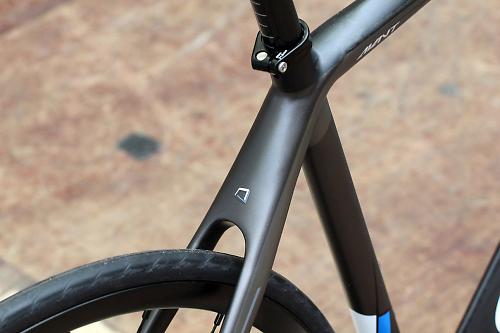
Like most endurance bikes, the Avant has loads of tyre clearance. A good thing because the supplied 22mm tyres (though the official spec says they should be 25mm wide) caused a less than smooth ride. A pair of Panaracer Gravel King 28mm tyres, inflated to about 70-75psi, made the world of difference. With them the ride was far smoother, rough road surfaces were smothered and they open up the possibility of heading away from the main roads onto gravel tracks and bridleways. Even so, it's not as smooth running on rough roads as the Bianchi Infinito, our current benchmark endurance road bike.
Without doubt the Avant's trump card is its descending prowess. That's largely down to the Shimano hydraulic brakes. They're really very very good. And I mean good in all conditions, not just in the wet, but also in the dry. There is plenty of modulation at the lever, such that you can easily determine where the bite point is and apply just enough power in any situation.
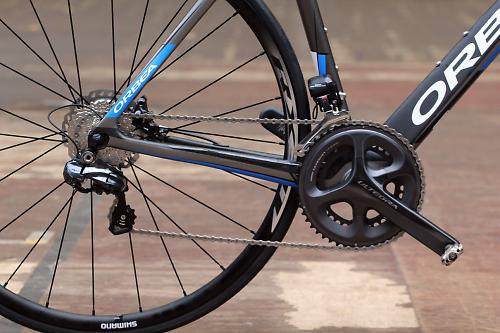
I never locked a wheel once during testing, in the wet or dry. If you want you can hurtle down hills faster, safe in the knowledge you can stop safely and easily. Or you can travel at the same speed as you would normally, but just have the extra control to be able to safely control your speed throughout the descent.
No issues or reliability concerns were raised throughout testing. If you ride through puddles or mud, you might get a bit of tinkling as the crud squeezes between pad and rotor. I tried dragging the brakes down some of the 20% descents in my area, most finishing with a dead stop at a T-junction, to see how they handle the heat buildup. No problems whatsoever. For the record, the bike had a 160mm front rotor and 140mm rear rotor.

The hydraulic brakes provide a level of confidence I've rarely felt with caliper brakes. The steeper the descent the more that performance gap between caliper brakes becomes a yawning chasm. And it's on the descents that the weight is less of a hindrance.
Frame: Versatile future-proofed carbon frameset
Spanish company Orbea designed the Avant to be versatile. You could, if you wanted, fit caliper brakes, a mechanical groupset and skinny tyres. That means Orbea can offer a range of builds at different prices, starting from £679 for the aluminum version and £1,956 for the cheapest carbon model with disc brakes, and providing plenty of upgrade potential on each model.

You could invest now in the caliper model and upgrade to disc brakes in a couple of years. It's unlikely the frame will lack compatibility in that time, unless everyone suddenly switches to bolt-thru: the Avant uses regular quick release skewers.
This carbon fibre version is a smart looking bike with a BB86 press fit bottom bracket, tapered head tube and neatly executed internal cable and Di2 wire routing. The frame can easily take a mechanical groupset as well. The rear hydraulic hose is routed inside the down tube, through the bottom bracket shell and out along the chainstay, where it pops out just in front of the chainstay mounted brake caliper. I had issues with the rear hose rattling inside the frame, but solved it with a rubber bung at the entry port.
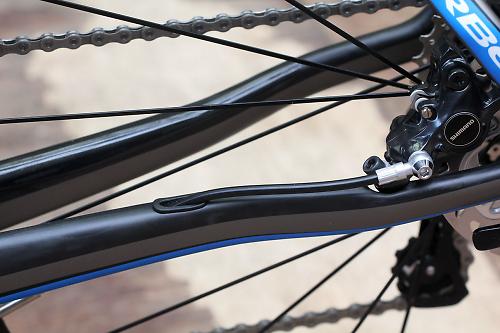
Skinny seatstays and a 27.2mm seat post attempt to offer a smoother rider. The oversized down tube and profiled top tube, along with the tapered head tube, ensure plenty of stiffness where it's needed. Riding the bike you can feel the high level of stiffness from front to back, and this translates into very direct and responsive handling.
The rear spacing is 135mm - which most manufacturers have come to accept as the standard for disc-equipped frames - but you can adjust it back to 130mm if you wanted to run caliper brake. If you fit calipers the rear brake is direct mounted underneath the chainstays.

Orbea's own carbon fork has the disc hose entering the top of the for and exiting above the caliper on the inside face. There aren't that many carbon disc forks on the market yet, and this is the smartest fork we've yet come across and shows the company have done their homework.
Build kit: Shimano Ultegra Di2 and hydraulic disc brakes
I had the luxury of testing the Shimano Ultegra 11-speed Di2-equipped bike with Shimano's new hydraulic disc brakes. Pressing a button to shift rather than pushing a lever takes a little getting used to, but that acclimation period is short. The front mech auto trim is a wonderful thing, and ensures no rub in any gear.

Battery life is brilliant. I took to charging it every Sunday evening. I probably didn't need to charge it that frequently but better than risk it going flat. It's easily charged, you plug a lead into the small box attached to the stem. The only downside to the internal battery is that you have to have the bike near a powerpoint, you can't remove the battery as you could with previous Di2, which means if you keep your bike in the shed or garage where there is no power, you're going to have to bring it into the house.
The 50/34 compact chainset and 11-28 cassette provides plenty of assistance to get the 8.55kg Avant up the hills. That's certainly not heavy; for comparison it's 0.45kg heavier than Orbea's own carbon Orca with Ultegra Di2, the discs and wheels clearly contributing some of that extra weight.
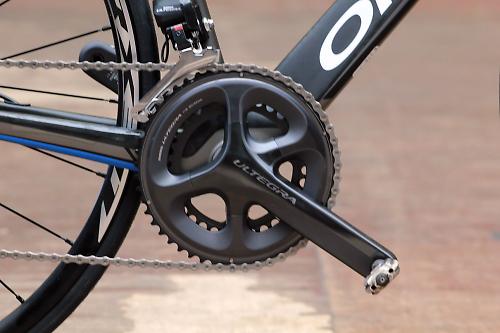
You notice the weight in the wheels though. They've fitted Shimano's RX-31 disc wheels, a £250 wheelset with a claimed 1795g weight. They feature a 24mm deep rim with 24 butted and bladed spokes in a two-cross lacing pattern. They use Shimano's Centre-Lock rotor mount system instead of the more common 6-bolt standard.
They're certainly up to the task of dealing with the extra forces generated by the brakes, and proved competently stiff in handling, but their weight noticeably blunts the performance of the Avant on the hills. Everywhere it was less of a problem. Maybe I've just been spoilt by a run of lightweight test bikes. It's early days for discs and we expect to see much lighter wheels coming soon.

As I mentioned above, the BR-R785 road hydraulic discs have been hugely impressive. You can read the full review here for the full in depth lowdown on them. Suffice to say, for a first generation road disc brake, they're impressive. But then Shimano has been doing mountain bike hydraulic disc brakes for years now. In fact, these don't look too dissimilar to an XTR caliper. It'll be interesting to see how and if Shimano can evolve the brakes in coming years; hopefully they can make them lighter.
The Avant is well equipped. An FSA Gossamer stem, nicely shaped Wing Compact handlebar and SLK 27.2mm seatpost topped with a Selle Italia Nekkar Flow saddle completes the bike. It's not the most comfortable saddle in the world, so I swapped it for a Prologo Scratch. I also switched to a longer 12cm, minus 17° stem halfway through the test to provide a fit that I'm more comfortable and used to.

The bike came fitted with 22mm Vittoria Diamate tyres - though the website does list 25mm tyres, so clearly a mistake there. We're seeing more manufacturers equip bikes with 25mm tyres. I however swapped them almost immediately for some 28mm tyres, and the difference was noticeable. There's no serious impact in speed or rolling resistance, but the extra comfort and traction were welcome benefits.
Conclusion
Are disc brakes the future for road bikes? Some people are adamant that they, some aren't so keen. One thing is clear, the technology works and on this bike they're a great performance benefit, though the weight penalty is a clear drawback. Lighter disc brakes and wheels are surely on their way, and hopefully then the weight difference can be narrowed. For now, unless you really want disc brakes, a non-disc road bike still offers more performance for your money.

Orbea have to be commended for investing in the technology with a thoroughly well thought out bike that offers fantastic performance, and it's so forward thinking with such versatility that any number of builds are possible, if you have the imagination.
I've been hugely impressed with the Avant, and if I'm honest, I'm a little taken with it. It's fun and fast, and great on the descents, though not so great going back up. I love its versatility, the ability to fit fatter tyres and the concealed mudguard mounts really appeal to me. If you could only have one bike, the Avant could be it.
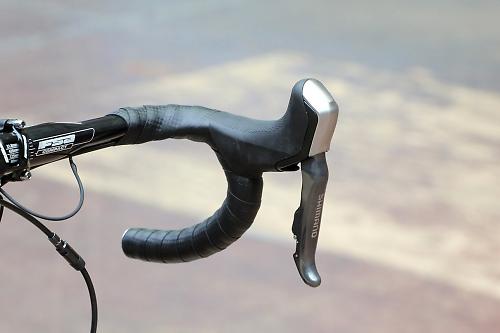
Whether disc brakes are the future is a debate that will rage for the foreseeable future. For now, the Avant is one of very few credible options if your dream bike involves disc brakes and wide ranging versatility.
Verdict
Fast and capable endurance road bike that benefits from Shimano's new hydraulic disc brakes.
road.cc test report
Make and model: Orbea Avant
Size tested: xx
About the bike
State the frame and fork material and method of construction. List the components used to build up the bike.
FRAME: ORBEA MONOCOQUE PERFORMANCE CARBON. DISC BRAKES COMPATIBLE. ELECTRONIC-MECHANIC TRANSMISION COMPATIBLE. INTERNAL CABLE ROUTING. PRESS FIT. TAPERED HEADTUBE.
FORK: ORBEA FULL MONOCOQUE PERFORMANCE CARBON. DISC BRAKE COMPATIBLE. INTERNAL CABLE ROUTING.
CRANKSET: SHIMANO ULTEGRA 6800 34X50
HEADSET: FSA 1-1/8 - 1-1/2" INTEGRATED
HANDLEBAR: FSA WING COMPACT
STEM: FSA TEAM ISSUE
SHIFTERS: SHIMANO ULTEGRA 6870 DI2
BRAKES: SHIMANO BR-R785 DISC
REAR DERAILLEUR: SHIMANO ULTEGRA 6870 DI2
FRONT DERAILLEUR: SHIMANO ULTEGRA 6870 DI2
CHAIN: SHIMANO ULTEGRA 6800
CASSETTE: SHIMANO ULTEGRA 6800 11-28 11-SPEED
WHEELS: SHIMANO RX-31
TYRES: VITTORIA DIAMANTE 700X25
PEDALS: N/A
SEATPOST: FSA SLK DI2
SADDLE: SELLE ITALIA NEKKAR FLOW
Tell us what the bike is for, and who it's aimed at. What do the manufacturers say about it? How does that compare to your own feelings about the bike?
With Shimano Ultegra 11-speed Di2 and hydraulic disc brakes, we ask the question: what more is there to want? The Avant M10D is that bicycle that is so laced with features that it becomes a must-have item. There is good reason to lust - at the end of the day, the Avant M10D is an endurance rider's dream road bike. With a higher/closer stack and reach profile than our Orca, the Avant lets you sit on the bike with a more relaxed position. The carbon fiber frameset is built to complement this bike's intended purpose of long rides on any road you might choose to follow.
Frame and fork
Overall rating for frame and fork
8/10
Tell us about the build quality and finish of the frame and fork?
Excellent.
Tell us about the materials used in the frame and fork?
Full carbon fibre construction with internal routing for Di2 and brake hoses.
Tell us about the geometry of the frame and fork?
Fast and stable, encourages a speed riding style.
How was the bike in terms of height and reach? How did it compare to other bikes of the same stated size?
Very good, slightly higher handlebar position and good reach promoted comfort, especially on longer rides.
Riding the bike
Was the bike comfortable to ride? Tell us how you felt about the ride quality.
With 22mm tyres, no. With 28mm tyres, yes very much so. The wheels are noticeable stiff and contribute a little to the sometimes harsh ride, but this is really only exceptionally rough roads.
Did the bike feel stiff in the right places? Did any part of the bike feel too stiff or too flexible?
Oh yes, loads of stiffness for excellent power transfer.
How did the bike transfer power? Did it feel efficient?
No problems there.
Was there any toe-clip overlap with the front wheel? If so, was it a problem?
None.
Tell us some more about the handling. How did the bike feel overall? Did it do particular things well or badly?
Lively and direct handling, quite an engaging bike.
Which components had the most effect (good or bad) on the bike's comfort? would you recommend any changes?
The wheels are heavy and blunt its climbing ability, and tarnish the ride quality.
Rate the bike for efficiency of power transfer:
9/10
Rate the bike for acceleration:
8/10
Rate the bike for sprinting:
8/10
Rate the bike for high speed stability:
9/10
Rate the bike for cruising speed stability:
9/10
Rate the bike for low speed stability:
8/10
Rate the bike for flat cornering:
8/10
Rate the bike for cornering on descents:
9/10
Rate the bike for climbing:
6/10
The high weight is noticeable on the climbs
The drivetrain
Rate the drivetrain for performance:
9/10
Rate the drivetrain for durability:
9/10
Rate the drivetrain for weight:
7/10
Rate the drivetrain for value:
8/10
Wheels and tyres
Rate the wheels and tyres for performance:
6/10
Wheels could be lighter
Rate the wheels and tyres for durability:
8/10
Rate the wheels and tyres for weight:
6/10
Rate the wheels and tyres for comfort:
7/10
Ride comfort with the 22mm tyres was poor, but it should come fitted with 25mm tyres anyway so this would be less of a problem.
Rate the wheels and tyres for value:
8/10
Controls
Rate the controls for performance:
8/10
Rate the controls for durability:
8/10
Rate the controls for weight:
7/10
Rate the controls for comfort:
7/10
Rate the controls for value:
8/10
Your summary
Did you enjoy riding the bike? Yes.
Would you consider buying the bike? If it had some better wheels, I might.
Would you recommend the bike to a friend? If they really want disc brakes, yes.
Rate the bike overall for performance:
8/10
Rate the bike overall for value:
8/10
Anything further to say about the bike in conclusion?
Better wheels and this bike would have got a nine star review.
About the tester
Age: 31 Height: 180 Weight: 67
I usually ride: My best bike is:
I've been riding for: 10-20 years I ride: Every day I would class myself as: Expert
I regularly do the following types of riding: road racing, time trialling, cyclo cross, commuting, touring, mtb,
David worked on the road.cc tech team from 2012-2020. Previously he was editor of Bikemagic.com and before that staff writer at RCUK. He's a seasoned cyclist of all disciplines, from road to mountain biking, touring to cyclo-cross, he only wishes he had time to ride them all. He's mildly competitive, though he'll never admit it, and is a frequent road racer but is too lazy to do really well. He currently resides in the Cotswolds, and you can now find him over on his own YouTube channel David Arthur - Just Ride Bikes.
Latest Comments
- RNTRMP 11 min 40 sec ago
" The lightest pedal system currently on the market" is debatable, the Xpedo Thrust SL are 168g a pair, KEO compatible, and a fraction of the cost.
- mark1a 49 min 42 sec ago
I think it depends on the Lidl. There's two near me, one is just half a mile away and has been open over 20 years. The bike parking is not great,...
- OnYerBike 1 hour 47 min ago
Obviously we only have the snippets of information from the newspaper report, but Mr Brayley might be correct....
- MattKelland 2 hours 11 min ago
Thanks! For some reason it's not showing up here: https://road.cc/show/tags/nmotd/145572
- brooksby 2 hours 12 min ago
But it's OK because our taxes are being used to subsidise those poor hard-done-by motorists by freezing fuel duty
- Surreyrider 2 hours 7 min ago
Yeah, I saw the Standard headline and thought 1 how many drivers have jumped red lights and been fined (after all they're the ones risking the most...
- PeteZahad 2 hours 29 min ago
I have the same issue and recently switched to hot waxing the chain and keeping the drive train free from conventional grease. On dry days a simple...
- bianchi51 2 hours 55 min ago
The Redshift bar has its potential uses; I've had a Giant Defy for a few years and I'm not as flexible now as when I bought it. I would really like...
- Benthic 3 hours 34 min ago
Highway Code rule 237 If you are dazzled by bright sunlight, slow down and if necessary, stop.































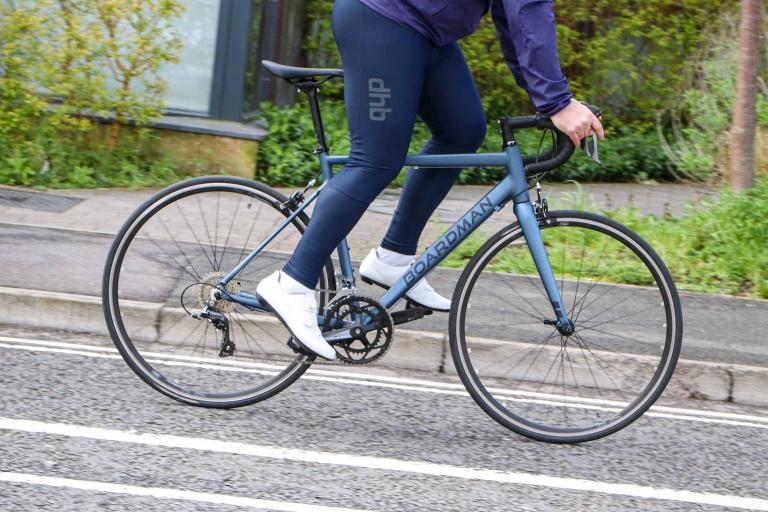
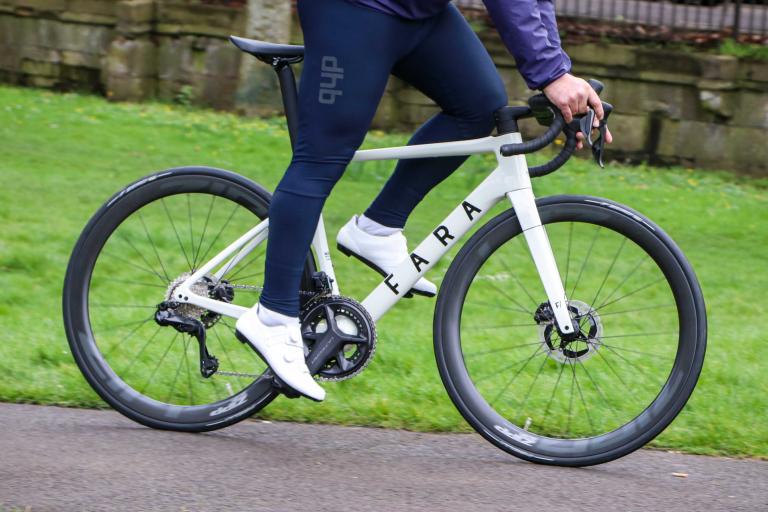
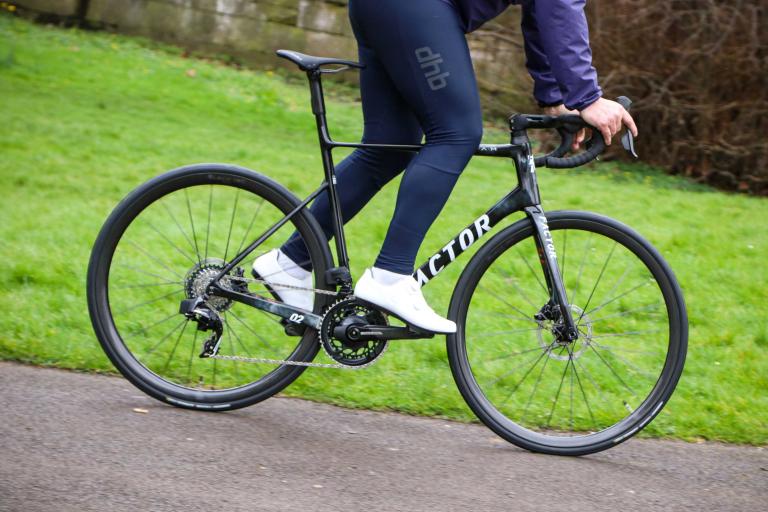
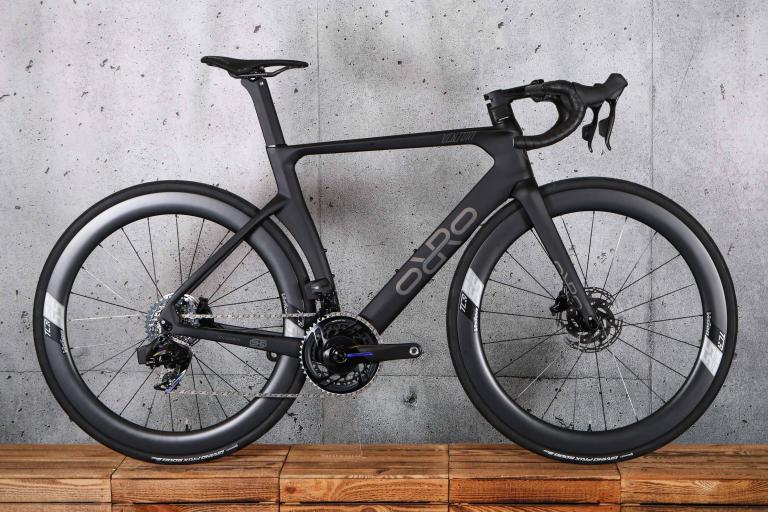
Add new comment
28 comments